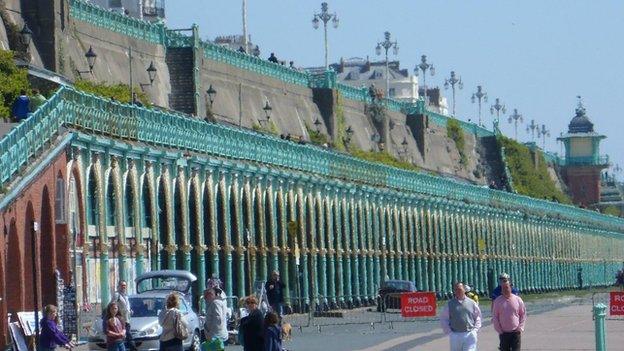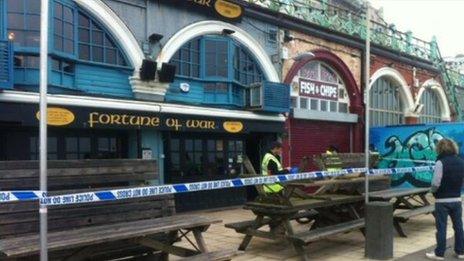Brighton seafront Madeira Terraces 'at risk of collapse'
- Published

Businesses are being relocated from Brighton seafront because their Victorian terrace premises are at risk of collapse.
Brighton & Hove council fenced off parts of Madeira Terraces earlier this summer, but engineers have now said the entire length of the structure should be closed with sections beyond repair.
The concern surrounds the corrosion of steel beams embedded in concrete which supports the deck of the terraces
Two businesses have been asked to move.
Gary Silver, owner of the JAG Gallery, posted a message, external on Facebook which said the gallery would close on 31 August and hoped to rise again "somewhere, someday".
He said the move had been forced on the gallery because Victorian structures were deemed to be in danger of collapse following "decades of neglect and lack of maintenance by successive local councils".
He declined to comment further to the BBC.
Studio 284 has also been asked to vacate, while nightclub Concorde 2 will remain open with neighbouring arches stabilised.
The council said it was working with JAG Gallery and Studio 284 to relocate them.
Calling for a long-term seafront maintenance plan, Simon Kirby, Brighton Kemptown and Peacehaven MP, said: "It is possible to maintain historic buildings within the budget. The council needs to pull its finger out and get on with it."
'End of life'
The council said the terraces did not seem to have been built with maintenance in mind 125 years ago because they had inherent problems such as steel beams buried in concrete which made them difficult to inspect and repair.
Regular surveys had been carried out and had shown some cast iron beams had cracked, and structural cast iron could not be repaired and had to be replaced.
The council said: "The terraces are effectively at the end of their life and any further maintenance would require major dismantling akin to rebuilding."
It said work was under way on a seafront investment plan and options for securing investment would be explored and recommended by the end of the financial year.
- Published26 April 2014
